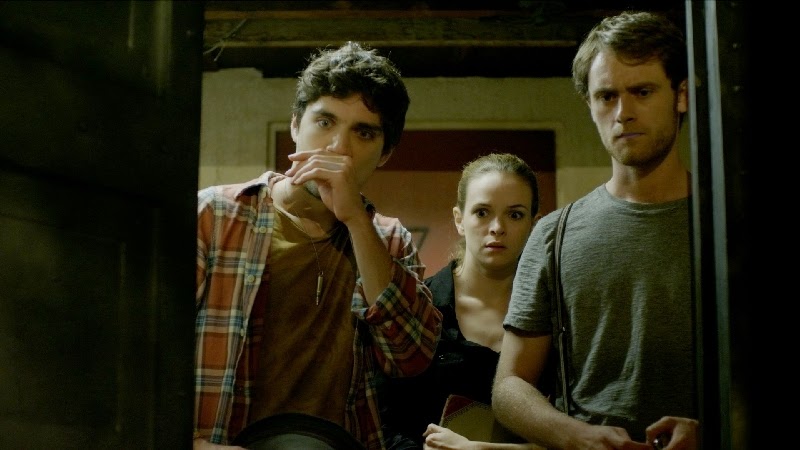Written by Bradley and B.P. Cooper
Directed by Bradley King
U.S.A., 2014
Life is difficult enough as it is without the pressures of having to follow the blueprints of a perfectly defined future. At least without knowing what tomorrow has in store a person can always reassure themselves with the knowledge that can create their own destiny. The concept of being told exactly what will happen in the near future is a frightening one. What could be changed? Why would something be changed? What risks are incurred by changing anything at all? Such existential queries are sufficiently weighty to bring madness upon anyone. Such is the precarious predicament a trio of protagonists find themselves wrestling with in the debut feature film from director Bradley King, Time Lapse.
Finn (Matt O’Leary), girlfriend Callie (Danielle Panabaker) and their roommate Jasper (George Finn) live together in a relatively cozy if modest one-story apartment in a gated community. Finn is a painter, aspiring to make a respectable living with his brush and his canvas although currently experiencing a dearth of creativity. Callie serves as landlord of the grounds, collecting rent and making certain everything runs smoothly. Jasper is decidedly on the lower end of the household’s hierarchy, banking what little money he has on dog race bets. Their simpleton lives, both collectively and individually, take a radical twist the day they make a shocking discovery in the apartment across theirs. The absentee renter, a scientist of sorts, left behind a humungous machine that can take pictures twenty-four hours into the future. With the machine aiming directly at their living room window, the trio uses the inexplicable technology to its own benefit but how much control of the future do the heroes really have?
For the most part Time Lapse efficiently builds suspense around its simple conceit, offering a tightly wound up story that showcases how a once closely-knit unit can break apart when its pieces begin to obsess over the details of their respective lives that were, that are and those that shall come to pass. Bradley King smartly offers up a depiction of people’s obsession with destiny. In this case said destiny is not manifest in the traditionally understood sense but rather figuratively served on a platter for the trio of plucky protagonists to observe, digest and then obsessively try to adhere to it out of fear that any deviation will lead to their obsolescence. Notwithstanding a few bumps in the road, most of which rear their ugly heads in the home stretch, Time Lapse is not only a strong piece of character development but a very fun ride as well.
The intensity that drives Finn, Callie and especially Jasper in replicating to the finest detail what the photographs indicate ‘will’ happen speaks directly to humanity’s continued desire to control its own future however cumbersome or ill conceived the strategies it adopts to remain on the path to what it believes it can attain. Theories, history, calculations, ecology, sociology common knowledge and the like are constantly utilized to predict either the best or most profitable outcome given the circumstances. It’s how people have operated since the dawn of human society. As history demonstrates greed frequently plays a major role in deciding which path to choose from, an instinct immediately replicated by Jasper and his roommates when the mysterious machine produces pictures of them holding up the next day’s race winners against the window. One thing leads to another, among them the fact that Jasper’s gangster contact Ivan (Jason Spisak) that puts up the bids learns of their trickery and gets in on the act himself with disastrous results.
What Time Lapse points out in devastating fashion is how people are ultimately selfish beings, willing to risk the good of the group for their own idiosyncratic purposes. Even attempts at preserving harmony within a society can be and often are smeared by one’s own personal agendas to the extent that it becomes all too difficult to differentiate altruism from greed. Director King handles the material quite handsomely, at ease with exploring the minutia of the human behaviour at play in a confined location where every move, wise or dumb, plays a huge role in whether or not the players will make out of their crisis alive. The film nicely juggles an easy, brisk pace whilst always paying character development it due. Near the very end Time Lapse frustratingly opts to add a twist with large repercussions on the overarching story that serves to convolute matters more than anything else. Although one can only assume what led the writers to proceed with said twist, on face value its employment suggests a lack of trust in the audience’s acceptance in how the protagonists have evolved up until that very point. Nothing could be further from the truth as much of what precedes the reveal makes perfect sense given the very far-fetched, science-fiction-driven circumstances.
The climax is indeed a nagging issue as one leaves the theatre since the picture is very close to being great entertaining, not to mention highly intelligent. That one issue aside (albeit a glaring one), Time Lapse is a confident directorial feature-length debut from Bradley King. Assuming the writer-director works on his endings a bit more there is a lot of promise here. Then again, who can predict the future, really?
Please visit the official website of the Fantasia International Film Festival.
-Edgar Chaput




